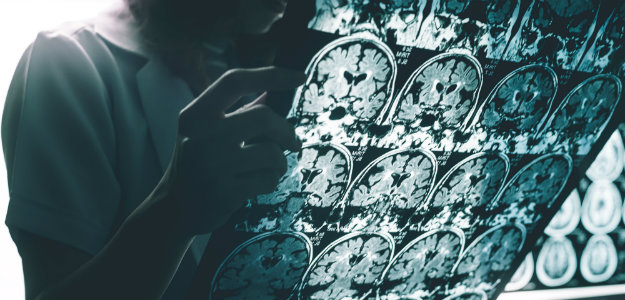Early diagnosis of Alzheimer’s disease allows you to treat it sooner and stay healthy and independent for longer. Head CT scans are one of the most effective tools to detect the condition. Learn how a head CT scan can help you or your loved one with memory loss determine if an advanced condition like Alzheimer’s disease is the root of the symptoms.
Head CT scan: the first step in understanding Alzheimer’s disease
Head CT scans provide a detailed view of the brain. During a CT scan, a technologist uses special equipment to collect multiple images of an area of the brain from different angles.
The goal of a head CT scan for Alzheimer’s disease is twofold. First, the scan helps your doctor rule out conditions that mimic Alzheimer’s disease. These include tumors, hemorrhages and strokes.
CT scans also help detect the loss of brain mass linked to Alzheimer’s disease. In an affected brain, there are typically abnormal levels of a protein called amyloid, which causes amyloid plaques to form. Along with plaques in the brain, Alzheimer’s disease destroys important neurons, causing the brain to shrink. Your doctor will notice shrinkage on a CT scan.
Signs you may need a head CT scan
Some people with a family history of Alzheimer’s disease or dementia get a scan proactively for peace of mind. Others may have the scan after showing these symptoms of Alzheimer’s disease:
- Behavioral changes
- Cognitive decline
- Delusions or hallucinations
- Difficulty understanding others when they speak
- Loss of appetite
- Memory loss
- Mood changes, including irritability and depression
- Problems with depth perception
Memory loss is not inevitable with aging. If your loved one has memory loss and any of the above symptoms, it may be time to speak with your doctor about further testing.
Alternatives to a head CT scan
Head CT scans may be the most effective way to diagnose Alzheimer’s disease. But if you prefer another method, magnetic resonance imaging (MRI) of the head shows your doctor if you have mild cognitive impairment or brain shrinkage. Cognitive tests are available online to download, print and bring to a doctor’s office for a score. One option is the SAGE test from the Ohio State University Wexner Medical Center.
To get the most accurate diagnosis, your doctor may recommend combining tests and scans. For example, you can have a head MRI along with an assessment by your primary care doctor.
Facing the idea that you or a loved one might have Alzheimer’s disease is difficult. It’s important though to not delay important imaging scans. Learn more about how CT scans help you and how to prepare for an upcoming appointment.
